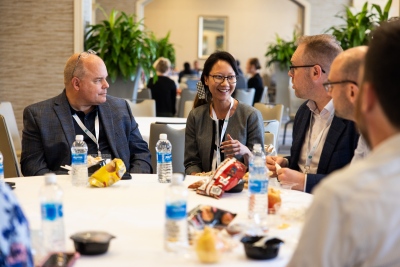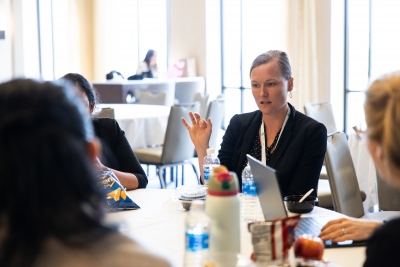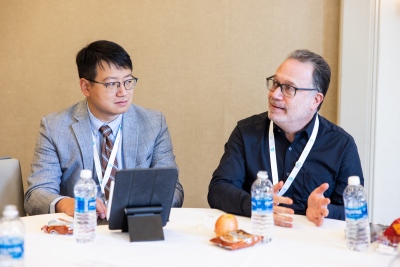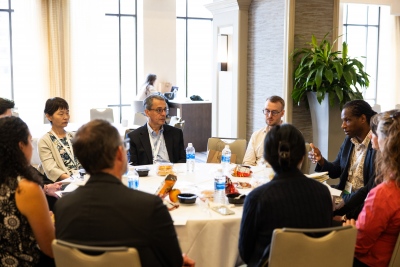2025 Round Table Sessions
2025 Round Table Sessions include the following topics from which participants may choose during registration:
Bioinformatics and data interoperability of clinical cancer genomics
Description: This round table will cover the data interoperability of genomic data across institutes for consultation services or quality assurance purposes with EHR standards (e.g., HL-7, FHIR, mCODE), as well as the underlying properties of the data and how it can be structured and stored to enable interoperability between different global frameworks, existing variant classification guidelines (AMP vs ESMO), and different gene fusion callers.Clinical applications and guideline updates for liquid biopsy
Description: This round table will focus on the current and potential use of liquid biopsy (including circulating tumor cells, cell-free DNA and cell-free RNA) for cancer early detection, resistant mutation detection, and measurable residual disease detection for both hematologic neoplasms and solid tumors.Artificial Intelligence (AI) and Machine Learning (ML) in clinical genomics
Description: This round table will explore the applications of AI and ML in data analysis, interpretation, and decision support for cancer genomics, and explore the need to establish guidelines for implementation and validation of AI/ML tools. Relevant topics of discussion include “experiences with LLM-generated evidence abstracts” and “experiences with variant oncogenicity prediction classifiers”.Complex structural rearrangement analysis with novel technologies
Description: New technologies including optical genome mapping (OGM), Hi-C, and long-read sequencing (LRS) allow the resolution of complex chromosomal structural rearrangements. This round table will allow participants to share their experience and/or cases, and how to integrate these technologies effectively in clinical practice.The clinical application of genome/exome sequencing (GS/ES) and long read sequencing (LRS)
Description: The costs of GS, ES, and LRS have been lowered recently to permit their clinical use. This round table will examine the topics such as: will the clinical application of these technologies allow new possibilities in patient care? How should laboratories handle and report the massive amount of additional data of unknown and potential secondary findings?Cancer genomics in underserved populations and communities
Description: This round table will explore cost-effective and accessible genomic technologies for cancer diagnosis and treatment in resource-limited environments (including underdeveloped countries, rural hospitals, and small pathology groups). This roundtable may also cover disparity and related solution for access to genomic technologies, as well as implementations of new classifications (such as WHO 5th edition and ICC) and clinical guidelines (such as NCCN and ELN guidelines) in low-resource settings.Clinical implementation of pharmacogenomic testing
Description: This round table topic will cover implementation of testing to identify inherited genomic variation that is associated with the clinical effectiveness or safety of drugs. This testing offers patients the opportunity for customized treatments that can minimize adverse effects and maximize the therapeutic benefits of drugs used for cancer treatment and supportive care. Additional topics to be examined may include the role of genetic ancestry in pharmacogenomics research, discovery, and application.Implementation of transcriptome sequencing for Pan-heme classification
Description: The power of transcriptome sequencing (RNA-seq) in identifying known and novel oncogenic drivers in hematologic malignancies, and its implementation as a global genomic assay to provide comprehensive molecularly subtyping for different hematologic malignancies, is increasingly being appreciated. This round table will allow participants to discuss their experiences and challenges in implementing RNA-seq as a tool for Pan-heme classification (B-ALL, AML, and lymphomas).Networking round table geared towards current/prospective fellows, lab management, and promotion
Description: This round table will provide an opportunity to 1st time CGC attendees, new CGC members, current/prospective fellows, fellowship training program directors, and experienced CGC members to network and share common experiences. Potential topics of interests include applying to ACGME laboratory genetics and genomics (LGG) fellowships, excelling during LGG fellowship training, preparing for ABMGG board exams, job search, academic promotion and negotiations.Clinical laboratory automation
Description: This round table will focus on the use of technology and automated systems to perform routine tasks in both pre-analytic and analytic phases with minimal human intervention, significantly improving efficiency, accuracy, and speed in processing patient samples, ultimately leading to faster and robust diagnosis and better patient care. The challenges associated with implementing automation like high initial costs, technical expertise requirements, and the need for proper integration with existing systems will also be discussed.DNA methylation for molecular subtyping of CNS tumors and other rare tumors
Description: Tumor classifiers with DNA methylation profiles have become mainstream practice in CNS tumors, with more recent application in sarcomas and hematologic malignancies. This round table will discuss validation, data transportability, comparability across platforms, novel technologies and other considerations for implementation of methylation-based profiling in clinical usage.
Somatic variant classification in cancers and clinical use of the ClinGen/CGC/VICC oncogenicity guidelines in practice
Description: This round table will discuss the clinical use of the oncogenicity guidelines (Horak P, et al. Standards for the classification of pathogenicity of somatic variants in cancer (oncogenicity): Joint recommendations of ClinGen, CGC, and VICC. Genet Med 2022; 24:986-998) for variant classification. It will also cover the application of emerging functional studies (e.g. MAVEs) and multi-omics technologies as tools to improve variant classification in clinical and workgroup settings.





